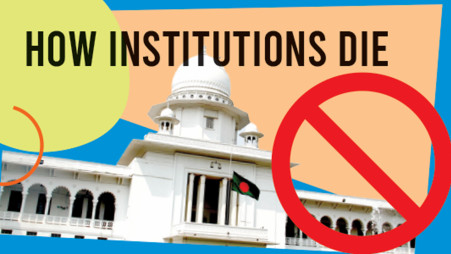SC reinstates caretaker govt, but not for February JS polls
Caretaker government system was abolished during AL rule in 2011
The Appellate Division of the Supreme Court today (20 November) issued a ruling that prospectively restores the provision for the election-time non-partisan caretaker government system in the Constitution.
However, the verdict specified a phased implementation, stating the system will not apply to the imminent 13th national elections.
The full bench of the Appellate Division, led by Chief Justice Syed Refaat Ahmed, announced the judgement, which came after intense political and legal scrutiny of the 2011 decision that had abolished the system.
The six other judges on the bench who delivered the landmark verdict are Justice Md Ashfaqul Islam, Justice Zubayer Rahman Chowdhury, Justice Md Rezaul Haque, Justice SM Emdadul Hoque, Justice AKM Asaduzzaman, and Justice Farah Mahbub.
The court announced that the caretaker government system, originally inserted via the 13th constitutional amendment of 1996, has been "activated and revived". The court declared its satisfaction that the previous judgement was "tainted by several cited errors apparent on the face of the record", thereby setting it aside in its entirety.
Caretaker government not possible for February JS polls
The ruling dictates the following timeline for the two upcoming elections. The 13th parliamentary election, due in February next year, will be held under the incumbent interim government, while the 14th national polls will be serviced by the restored caretaker government system, which will be fully implemented and operational starting from this election.
This phased implementation is necessary because the constitutional mechanism needed to form the caretaker government – such as the requirement to form it within 15 days of the dissolution of parliament – can no longer be triggered, as the parliament was dissolved more than a year ago.
Crucially, the apex court specified a phased application for the restored system, stating it will only operate prospectively. This aligns with the position advocated by lawyers for the petitioners, who argued that constitutional limitations prevent its immediate application.
Speaking at a media briefing later at the Foreign Service Academy in Dhaka, Law Adviser Asif Nazrul explained that although the court has revived the caretaker government provision, constitutional timelines make it impossible for the mechanism to operate during the upcoming election cycle.
"As per the Constitution, such a government must be formed within 15 days before or after the dissolution of parliament. Therefore, it can only be constituted after the next parliament completes its term. The 13th parliamentary elections will be held under the current interim government," he said.
'People's voting rights established'
Political parties, including the BNP and the Bangladesh Jamaat-e-Islami, welcomed the verdict, calling it a victory for citizens' voting rights and a step toward credible future elections.
Leading lawyers representing the political parties involved in the case expressed strong satisfaction with the Supreme Court's verdict, hailing the restoration of the system as a victory for the people's voting rights.
Attorney General Md Asaduzzaman said, "The system introduced through the 13th Amendment to the Constitution in 1996 has now been declared constitutional, and not in conflict with the Constitution."
How caretaker debate reached the court again
The caretaker government system was introduced in 1996 through the 13th Amendment during the BNP government, following opposition movements led by the Awami League.
In 1998, three lawyers, including M Salimullah, challenged the amendment in the High Court. The petition was dismissed in 2004, and the petitioners again appealed in 2005.
After two years of caretaker rule during the 2006-2008 political crisis, questions were raised about the system's weaknesses.
When the Awami League returned to power, the Appellate Division began hearing the appeal on 1 March 2010.
Eight senior lawyers appeared as amici curiae, arguing in favour of retaining the system, while then attorney general Mahbubey Alam also supported it.
On 10 May 2011, the Appellate Division, by majority, declared the 13th Amendment void.
Before the full verdict was released, the parliament passed the 15th Amendment on 30 June 2011, abolishing the caretaker system. It received presidential assent on 3 July 2011. Former Chief Justice ABM Khairul Haque subsequently declared the caretaker system unconstitutional.
Following the political shift on 5 August last year, several review petitions were filed seeking reconsideration of the 2011 verdict.
On 27 August 2024, one was submitted by prominent citizens Badiul Alam Majumder, Tofail Ahmed, M Hafizuddin Khan, Jobairul Haque Bhuiyan and Zahra Rahman.
On 16 October 2024, BNP Secretary General Mirza Fakhrul Islam Alamgir filed another petition.
Jamaat-e-Islami Secretary General Mia Golam Porwar filed a third one on 23 October the same year.
A freedom fighter from Naogaon, Mofazzal Hossain, submitted a separate application.
After hearing these pleas together, the Appellate Division decided to rehear the original appeal against the High Court verdict.
Lawyers Sharif Bhuiyan, Barrister Ruhul Kuddus Kazal, Barrister Zainul Abedin, and Advocate Mohammad Shishir Manir represented the petitioners.
The final hearing concluded on 11 November, and the Appellate Bench set 20 November for the verdict.
The law adviser at the briefing said, "By cancelling the system, Khairul Haque shut the door on democratic practice. The Appellate Division has now restored that effective and trusted mechanism through a historic judgement."



 Keep updated, follow The Business Standard's Google news channel
Keep updated, follow The Business Standard's Google news channel





















